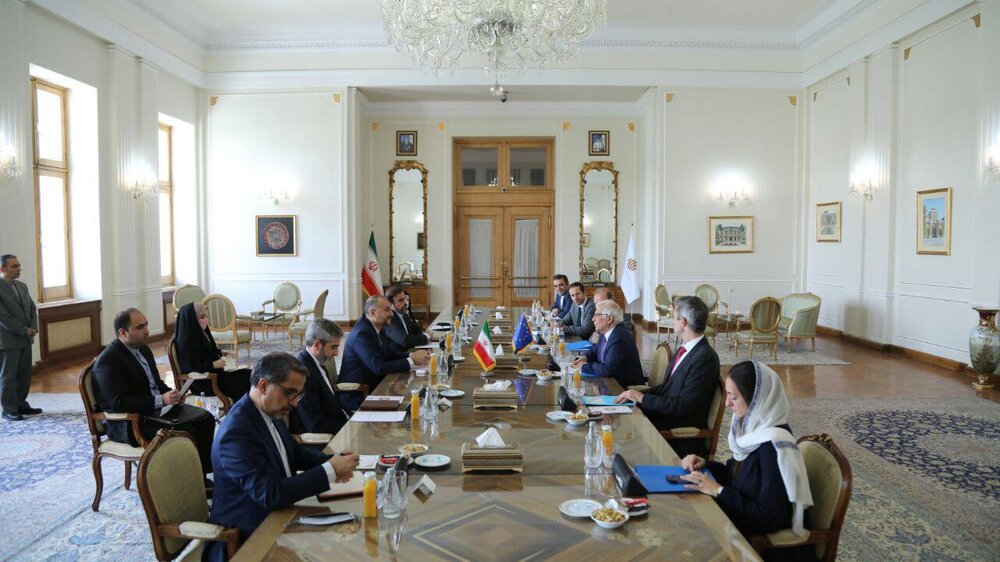Iran moves Vienna talks to Qatar

TEHRAN – The visit of the European Union’s foreign policy chief to Tehran seems to have resulted in a number of important moves that could boost Iran’s foreign policy and regional diplomacy.
After more than three months of hiatus in the Vienna talks, Josep Borrell, who also acts as the coordinator for the talks, succeeded in breaking the ice in a surprising way. His visit to Tehran was topped off with an important announcement: the stalled talks over reviving the 2015 nuclear deal, officially known as the Joint Comprehensive Plan of Action (JCPOA), will resume in the coming days.
“In meeting with Iranian Foreign Minister Hossein Amir-Abdollahian @Amirabdolahian we agreed on resumption of negotiations between Iran and US in the coming days, facilitated by my team, to solve the last outstanding issues,” Borrell said on Twitter.
In addition to Amir Abdollahian, Borrell also met with Ali Shamkhani, secretary of Iran’s Supreme National Security Council. After this long meeting, another important announcement was made: The Vienna talks will no longer be held in Vienna. Instead, they will be moved to a Persian Gulf country, possibly Qatar.
Borrell didn’t say which country will be the venue for the talks. But Iranian officials and media said Qatar will be most likely to play host for the talks. In addition to the venue, the format of the talks has changed too. According to Borrell, the new round of talks in the Persian Gulf will no longer be held in the P4+1 formant. Instead, it will be talks between Iran, the EU, and the U.S., a big change that seems to have moved past the traditional format of the P5+1 group of countries.
The resumption of talks in a Persian Gulf country is also important for another reason: it comes amid Iranian efforts to patch up relations with the Persian Gulf Cooperation Council countries, most notably Saudi Arabia and the United Arab Emirates (UAE), in line with the Raisi administration’s new foreign policy doctrine known as “neighborhood policy”.
The policy is built around fostering cooperation with neighboring countries and non-Western powers. Iran has made strides under this policy in Central Asia. Leaders of Turkmenistan, Tajikistan, and Kazakhstan have exchanged visits with Iran in recent weeks.
The visits have resulted in the signing of many cooperation documents and projects. During the visit of Kazakh President Tokayev to Iran this month, the presidents of Iran and Kazakhstan ordered the all-rail transit of Kazakhstan's first container train via Iran in a ceremony that was held through a video conference with the Tehran Railway Station.
Raisi’s neighborhood policy could receive another boost from holding talks in Qatar as it will likely signal Iran’s good faith and seriousness to forge ahead with mending fences.
Iranian and Arab officials have exchanged visits over the last few months and they continue to keep in close contact with each other. President Raisi has visited Oman and Qatar and he has a visit to the UAE on his agenda though the exact date of this visit is yet to be set.
Relations between Tehran and Riyadh are also improving, given the visits of Iraqi Prime Minister Mustafa al-Kadhimi to Iran and Saudi Arabia. Of note, the Iraqi prime minister has begun shuttle diplomacy between Tehran and Riyadh. He paid a visit to Saudi Arabia and met with Crown Prince Mohammad bin Salman and then left Jeddah for Tehran. On Sunday, he arrived in the Iranian capital and met with President Raisi. The main goal of al-Kadhimi is reportedly to soothe tensions between Iran and Saudi Arabia.
Leave a Comment